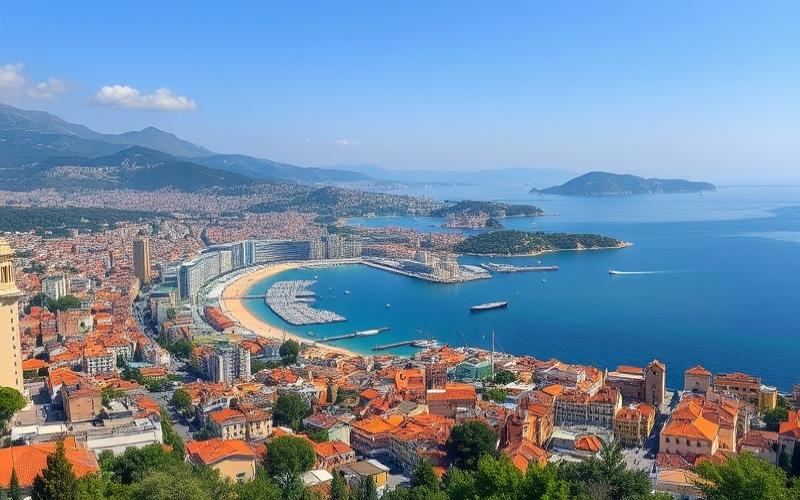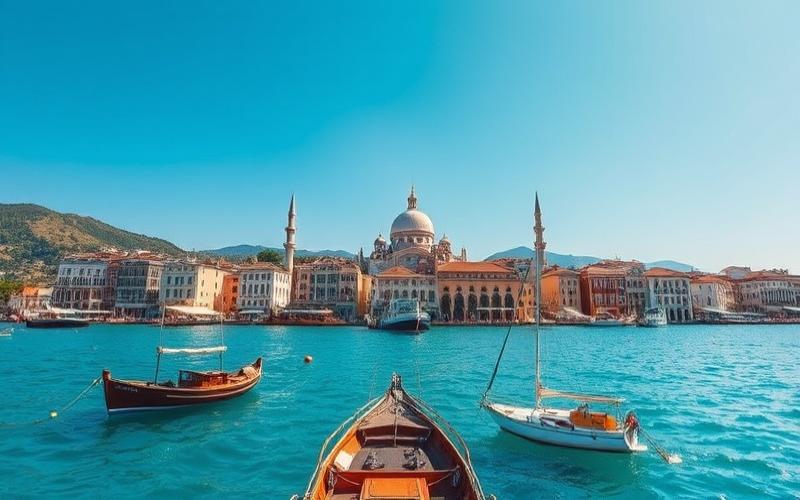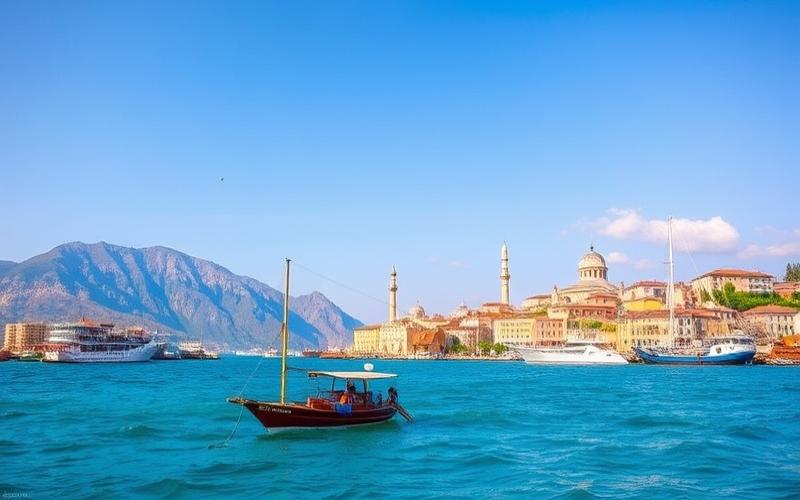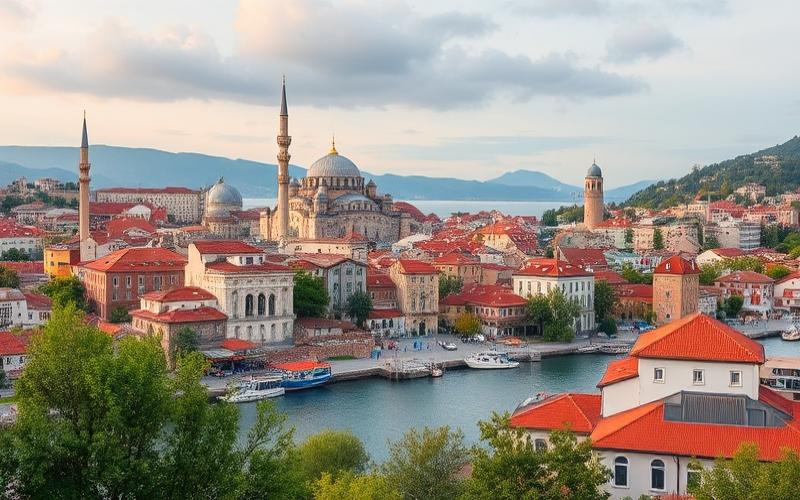
 Published on and written by Cyril Jarnias
Published on and written by Cyril Jarnias
Turkey, a country with invaluable natural wealth, stands at a crucial crossroads as it strives to balance economic development and environmental preservation. Faced with growing environmental challenges, from rapid urbanization to industrial pollution, the nation is undertaking bold legislative reforms and multiplying initiatives to protect its natural heritage.
Recent efforts to strengthen environmental law reveal increased political will and a collective awareness of the ecological urgency. This article explores how current regulations and innovative initiatives are shaping Turkey’s legislative and environmental landscape, while highlighting the obstacles and opportunities along this transition toward a more sustainable future.
Environmental Law in Turkey: Legal Framework and Fundamental Principles
The Turkish legal system is based on a civil law model, inspired by European continental law, and is progressively integrating international and European standards into its approach to environmental law. Environmental protection is structured around modernized framework laws, a detailed regulatory arsenal, and a judicial system that increasingly emphasizes sustainability and prevention principles.
Key Legislation for Environmental Protection
- Environmental Law No. 2872 (1983, revised multiple times): The cornerstone of Turkish environmental law, it defines the fundamental principles of pollution prevention, sustainable management of natural resources, and public participation.
- Environmental Impact Assessment (EIA) Regulation: Requires rigorous analysis of environmental effects for any major project before authorization.
- Regulations on Waste Management, Water and Air Quality, Soil Conservation: A set of sectoral texts establishing strict standards and control procedures.
- Turkish Penal Code (Articles 181-182): Criminalizes intentional or negligent pollution, with penalties ranging from 6 months to 3 years in prison, doubled in cases of lasting damage or serious risks to human and animal health.
Fundamental Principles
- Right to a Healthy Environment: Recognized by the Turkish Constitution and the Environmental Law, it comes with the duty of the state and citizens to protect the environment.
- Sustainable Development: Embedded in legislation, it aims to reconcile economic growth with resource preservation for future generations.
- Precautionary and Prevention Principle: Any activity likely to harm the environment must be previously assessed and, if necessary, adapted or prohibited.
Main Government Agencies
| Agency | Main Role |
|---|---|
| Ministry of Environment, Urbanization and Climate Change | Policy development, compliance control, issuance of environmental permits |
| Turkish Environment Agency | Implementation of protection programs, monitoring of environmental indicators |
| Local Authorities | Local enforcement of regulations, waste management, pollution monitoring |
Major International Treaties Ratified by Turkey
- United Nations Framework Convention on Climate Change (UNFCCC)
- Kyoto Protocol and Paris Agreement
- Basel Convention on the Control of Transboundary Movements of Hazardous Wastes
- Bern Convention on the Conservation of European Wildlife
- Barcelona Convention for the Protection of the Mediterranean Sea Against Pollution
Examples of Landmark Cases and Judicial Decisions
- Afsin-Elbistan Thermal Power Plant Case: Project suspended due to insufficient environmental impact assessment, marking the effective consideration of the precautionary principle.
- Decision on the Protection of Kazdağları Natural Park: The Council of State canceled mining permits, ruling that ecological interest outweighs economic interests in protected areas.
- Strengthened Criminal Penalties for Intentional Pollution: Exemplary convictions of companies for illegal waste dumping, illustrating the effective application of Penal Code Articles 181-182.
Current Challenges for Improving Turkey’s Environmental Legislative Framework
- Uneven application of environmental standards, particularly at the local level.
- Pressure from economic development and rapid urbanization, sometimes at the expense of natural resource protection.
- Need to strengthen transparency, public participation, and independent oversight.
- Continuous adaptation of legislation for alignment with the European Union acquis and consideration of new challenges (climate, biodiversity, hazardous waste management).
Summary
Turkey has a comprehensive environmental legal framework, based on Law No. 2872, strong constitutional principles, and a willingness to harmonize with international standards. Despite notable progress, effective implementation and adaptation to contemporary challenges remain major priorities.
Good to Know:
Environmental law in Turkey is part of a legal system that combines civil law tradition and European influences, with foundations such as the right to a healthy environment and sustainable development. The 1983 Environmental Law is the cornerstone of environmental legislation, complemented by laws on water, air, and waste. Key agencies, like the Ministry of Environment, Urbanization and Climate Change, play a central role in implementing this legislation. Turkey is a party to many international treaties including the Kyoto Protocol, influencing its national regulations. Landmark cases, such as the decision on the Ceyhan coal power plant project, illustrate judicial trends in environmental preservation. However, the need to improve law enforcement and strengthen regulations to address pollution and rampant urbanization remains a major challenge.
Ecological Initiatives: How is Turkey Positioning Itself?
Turkey has launched several major ecological initiatives aimed at transforming its development model and aligning with global carbon neutrality goals by 2053. These projects cover priority sectors such as renewable energy, waste management, sustainable agriculture, and biodiversity preservation.
Main Initiatives and Priority Sectors:
Renewable Energy:
- Goal to quadruple wind and solar capacity to reach 120 GW by 2035.
- Total planned investment: $108 billion from public and private sources.
- Accelerated administrative procedures to reduce permit issuance time (from 4 to 2 years).
Current Energy Mix (2022):
| Source | Installed Capacity (GW) | % of National Mix |
|---|---|---|
| Hydropower | 32 | ~30% |
| Wind | 11 | ~11% |
| Solar | 9 | ~9% |
Approximately 50% of Turkey’s electricity already comes from renewable energy sources.
International rankings:
- 6th in Europe for installed wind power capacity
- 11th globally, highlighting strong momentum in this sector
Sustainable Agriculture and Water Management:
Pilot projects in rural areas (example: Konya), with rehabilitation of degraded soils, optimized water management, increased agricultural yields while reducing erosion.
Biodiversity Protection:
Calls for projects supporting local NGOs on:
- Conservation/restoration of ecosystems
- Combating invasive species
- Marine protection (especially the Mediterranean)
- Promotion of a circular economy
Legislative Framework and Partnerships:
Recent adoption of a climate change law, establishing a clear legal framework for:
- Gradual reduction of national emissions
- Strengthened support for local green sectors
- Accelerated integration with international environmental standards
Close collaboration with:
- Global Environment Facility (GEF)
- Foreign embassies through environmental project calls
- Private initiatives in the energy or technology fields
Major Challenges Faced by Turkey:
- Persistent dependence on fossil fuels despite rapid growth in renewables
- High urban pollution, linked to road transport and industry
- Need to further integrate ecological criteria into all economic sectors
- Increased vulnerability to natural disasters, exacerbated by climate change
Responses Provided:
- Increased financial support to accelerate the green transition.
- Administrative simplification to attract public/private investments to the ecological sector more quickly.
- Gradual strengthening of regulatory control over urban industrial pollution.
- Increased awareness through national educational programs.
Turkey’s ecological commitment is structured around ambitious goals, underpinned by a solid recent legislative arsenal, but remains confronted with the complex challenge of reconciling rapid economic growth, national energy security, and climate imperatives.
Good to Know:
Turkey is intensifying its ecological efforts through several initiatives, particularly in renewable energy with the establishment of large wind and solar farms, and in waste management through advanced recycling programs. The country is also engaged in biodiversity protection, with the creation of protected areas and conservation programs. These initiatives are anchored in legislative frameworks like the Environmental Law, reinforced by partnerships with international organizations such as the European Union and collaborations with the private sector. However, Turkey faces challenges such as urban pollution and the need to integrate sustainable practices into its industries. To address these, increased efforts are needed in environmental education and sustainable investments, supported by economic incentives to stimulate green innovation.
Turkey’s Adaptation of Environmental Regulations to EU Standards
Turkey is adapting its environmental regulations to comply with European Union standards through a series of major legislative reforms, progressive harmonization of its laws, and transformation of its industrial practices.
Main Reforms and Legislative Adjustments
- Adoption of Environmental Law No. 2872, the cornerstone of Turkish environmental law, which mandates mandatory environmental impact assessments (EIA) for any project likely to affect the environment.
- Implementation of regulations on waste management, air quality, emission control, and biodiversity preservation.
- Alignment of legislation on product compliance (CE requirements, market surveillance, accreditation) following the EU-Turkey Customs Union of 1995, facilitating free movement of goods and harmonization of technical standards.
- Development of incentive policies to promote renewable energy (wind, solar), sustainable mobility (public transport, green spaces), and improved water resource management.
Table: Examples of Sectors with Significant Changes
| Sector | Major Changes |
|---|---|
| Waste Management | New regulations, sorting infrastructure, limitation of illegal landfills |
| Energy | Increased support for renewables, reduced reliance on coal |
| Transportation | Investments in public transport, creation of low-emission zones |
| Manufacturing Industry | Adoption of CE marking, emission controls, increased compliance with EU standards |
Major Challenges of Harmonization
- Economic: High cost of technical adaptations for industries, heavy investments required in environmental infrastructure, difficulties for SMEs to keep pace with reforms.
- Political: Fluctuations in political will, priority sometimes given to economic growth or social stability at the expense of strict environmental standards.
- Technical and Administrative: Limited administrative capacity for regulation enforcement, lack of qualified human resources, need to modernize monitoring and evaluation systems.
Turkey’s Motivations for Complying with European Standards
- EU Membership Perspective and desire to strengthen economic and political relations with the Union.
- Improved access to the European single market and increased attractiveness for foreign investors.
- Modernization of the economy, improvement of quality of life and public health.
- International pressure to combat pollution and climate change.
Potential Implications for Turkey
- Long-term economic benefits (facilitated exports, innovation, creation of green jobs).
- Strengthened environmental security and reduced health risks.
- Need to reconcile ecological transition and maintaining industrial competitiveness, particularly in traditional or highly polluting sectors.
Concrete Examples
- The recycling and waste management sector has undergone transformation, although challenges remain in managing imports of European waste and regulating recycling.
- The energy industry has seen rapid growth in renewable capacities, with massive investments in wind and solar.
- Industrial sectors (chemicals, metallurgy, construction) have adopted CE standards and emission controls to comply with European requirements.
Turkey is pursuing a delicate balance between harmonization with European standards, economic development, and management of its own environmental and social priorities. This process, while a source of progress, remains fraught with structural and political challenges.
Good to Know:
Turkey has undertaken a series of reforms to comply with European Union environmental standards, notably by revising its laws on waste management, air quality, and water protection. Legislative adjustments have enabled the adoption of European directives such as the Water Framework Directive and the Waste Framework Directive. However, this harmonization process faces obstacles, such as budgetary constraints limiting implementation capacities and internal political resistance. Modernizing infrastructure, particularly in the energy sector, represents a major challenge, but sectors like agriculture have already begun significant transformations to reduce chemical use. Turkey’s desire to continue its political and economic rapprochement with the EU, while stimulating local technological innovation, constitutes a strong motivation to align with these standards. Potential implications include improved quality of life and increased attractiveness for foreign investment, but require enhanced support to overcome technical and economic barriers.
Disclaimer: The information provided on this website is for informational purposes only and does not constitute financial, legal, or professional advice. We encourage you to consult qualified experts before making any investment, real estate, or expatriation decisions. Although we strive to maintain up-to-date and accurate information, we do not guarantee the completeness, accuracy, or timeliness of the proposed content. As investment and expatriation involve risks, we disclaim any liability for potential losses or damages arising from the use of this site. Your use of this site confirms your acceptance of these terms and your understanding of the associated risks.

























































